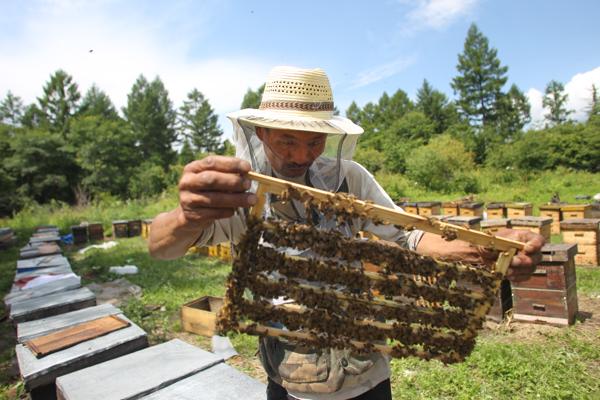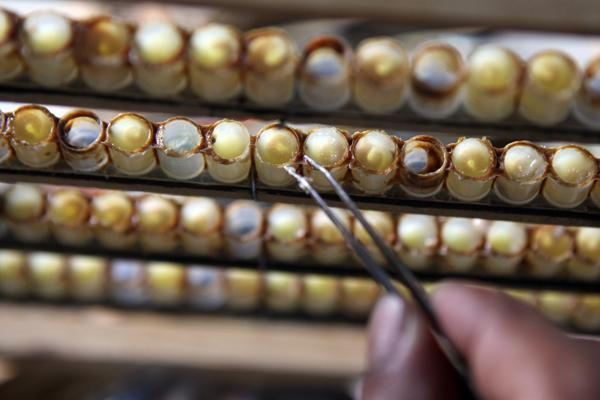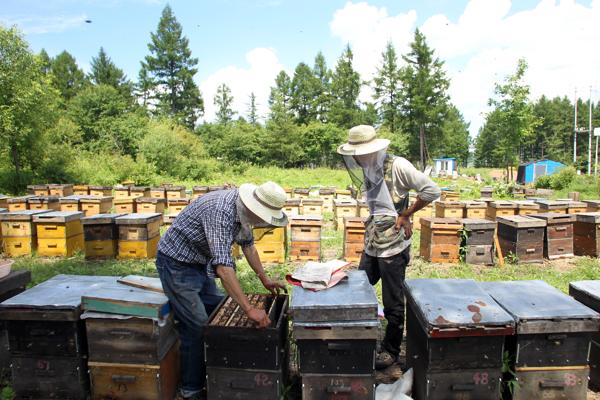
Chen Zongtao became a beekeeper last year to aid his recovery from alcoholism and “win back” the hearts of his family.[Photo by Zou Hong/China Daily]
Although China is one of the world’s largest exporters of honey, life is anything but sweet for the producers. The average age of the nation’s apiculturists is rising and young people are shunning the industry, meaning that ancient skills and techniques may soon be lost forever. He Na reports from Yichun, Heilongjiang province.
Deep in the woods at the Wumahe State Forest Farm in Yichun, Heilongjiang province, a cotton tent was pitched alongside a narrow road that leads to the foot of a nearby mountain. About 60 beehives stood in front of the tent, and swarms of honeybees buzzed busily back and forth in the sunlight.
To city dwellers, a tent is just a temporary refuge, a place for rest and play, but for Yan Fengbo, 36, and his wife, Wang Wei, 32, their tent is their home for five months of every year.
The latitude, 46 degrees north, means daytime temperatures can soar to 30 C in summer, while at night the mercury can fall to 10 C. However, the climate is of little consequence to bee farmers, who have no alternative to long hours of hardship if they are to produce the honey that provides most of their annual income.
China is one of the world’s largest honey producers. Statistics from the Apicultural Science Association of China show that more than 300,000 farmers raised 12.5 percent of the world’s bees last year. Moreover, consumption of honey in China has doubled in the past decade, and last year surpassed 350,000 metric tons, with a per-person average of more than 260 grams, close to Japan’s annual 300 g.
Those figures mask an uncertain future, though. Although there are more than 350,000 bee farmers, the average age is 48.7 years, and 50 percent of them are 50 or older. Those born in the 1980s or later account for less than 5 percent of the total.

Queen Bee larvae are raised artificially to produce royal jelly. [Photo by Zou Hong/China Daily]
‘Cherish every drop’
Yan is the youngster beekeeper in Yichun, a small town known as China’s “forest capital”, in the Lesser Hinggan Mountains.
A guide to raising honeybees lay on a cushion in his tent, many of the pages ripped and brown with age. Yan can’t remember how many times he has read the book. Because his father died when he was a child, Yan didn’t attend school. Instead, he taught himself to read by deciphering the subtitles on TV news programs. When he was 20, his stepfather introduced him to beekeeping, and he adheres to the traditional techniques he was taught then.
“Each honeybee only lives for 40 days, and in its 23-day working life it can make 5 grams of honey at most. We should cherish every drop, because it’s hard work, both for the beekeepers and the little creatures,” Yan said.
He’s a reserved man, and rarely makes eye-to-eye contact, but when talk turns to beekeeping, he’s a different person: informative and confident.
“Getting along with honeybees is simpler than dealing with people. The longer you keep honeybees, the more you love them. They are really selfless, honest and diligent. They have so many qualities people need to learn,” Yan said.
“They also have emotions, and the honey they make when they are happy is the very best,” he said.

Low status
Yan’s goal is for his bees to work happily, but Wang said making her husband happy is hard work. In Western countries, beekeepers have an enviable life, with a reasonable social status and good incomes. In China, beekeeping is considered one of the hardest jobs in the countryside.
In a good year, with mild temperatures and a fruitful spring, Yan can harvest about 1,500 kg of honey, which brings him 30,000 yuan ($4,830), but in a poor year the profit plummets.
Last year, a torrent of floodwater surged down the mountainside after a heavy storm, washing away half of his hives. The cost of replacing them almost wiped out Yan’s funds.
“High-quality honey is sold at a high price in the supermarket-generally more than 200 yuan a kilogram-but our produce is sold at a really low price, just 40 yuan per kilo,” he said.
“This year, the temperature is lower than usual, so the yield will be affected. But we will still only be paid 40 yuan, the same as last year, so my efforts are never fully rewarded. Instead, my family and friends look down on me-it’s hard to be a happy beekeeper,” he said, adding that he and Wang will soon start looking for temporary winter jobs.
Variations of Yan’s story can be heard from beekeepers across China. Every year from March to October, they toil to produce the delicacy, but the constant hardships and poor financial rewards mean a growing number are looking for other work.
“If it were not for my daughter, we might have moved south for factory work a few years ago,” Yan said.
The newcomer
Chen Zongtao is the exception that proves the rule. The 52-year-old has more than 200 beehives, and is one of Yichun’s most successful bee farmers. Unlike Yan, though, Chen is a newcomer. Last year, the laid-off forestry worker borrowed 200,000 yuan to buy the hives, bees and other equipment.
“In summer, the sun sets at 8 pm and rises at 3 am. Honeybees follow that pattern when they’re making honey, so I have to start work earlier than they do. In the past two months I’ve only slept four hours a day,” he said.
Chen is trying to turn his life around. He is a recovering alcoholic, and has lived alone since his wife left him and took their children with her. “I chose this hard life because I want to show them that I’ve changed. I want to win back their hearts,” he said.
Although he was prepared to face hardships and stings, he underestimated the risky nature of the business. Last year, his inexperience resulted in the bees dying in 30 of his 50 hives, so he has hired an experienced beekeeper from Anhui province to oversee this year’s yield. “Everything is on track now, and I’m praying for a ‘weather blessing’, “ he joked.
“I don’t know anything about the Internet. I just plan to cultivate some old customers. There will always be a market for good honey,” he said.
Looking ahead
Wu Jie, a researcher at the Bee Research Institute at the Chinese Academy of Agricultural Sciences, said, “The lack of talent and new blood has become the major obstacle for China’s apiculture industry. Improving the living standards of China’s bee farmers and raising their incomes are at the top of the industry’s agenda.”
He pointed out that Chinese beekeepers mainly learn their skills from their parents, but the family unit and traditional beekeeping methods limit the number of hives per household to between 60 and 100.
“However, in Western countries, depending on the mode of work and the level of mechanization, one family can keep 300 to 600 beehives, meaning their income is eight to 10 times that of Chinese beekeepers,” he said.
“Establishing beekeeping cooperatives, gradually raising standards and increasing the use of mechanization will be vital for the development of apiculture in China.”
‘Raising bees is like raising children’
Pan Lichun has been raising honeybees all his life. The Yichun native doesn’t have to worry about selling his produce, though, because his good reputation means people buy the honey before it’s even been made.
Life is not entirely sweet, however. Fewer and fewer young people are choosing beekeeping as a career, and Pan is disappointed that there is no new generation to carry the torch forward.
The 63-year-old has two sons: One is a driver and the another works for a furniture company. Although Pan offered to pass on all the skills and secrets he’s acquired over the years, neither son was moved by his entreaties.
Pan has a home in Yichun’s downtown, but every summer he moves to the mountains where he lives alone, apart from his bees. Many years ago, he worked at a grain store, and beekeeping was just a hobby, but when he was made redundant in the 1980s, he became a full-time beekeeper and helped his family endure a lot of hard times.
“Raising bees is like raising children-care and patience are more important than anything else. Always remember to check the temperature and moisture levels, and whether they have enough food to eat and air to breath,” he said.
Every year, he says it will be his last in the mountains, but he always returns the following spring.
Having almost given up hope of passing on his skills, Pan was delighted to engage two apprentices earlier this year, even though one is 50 and the another is 72.
“Better late than never, I guess ... I’ve discovered a new source of hope,” he said.
Zhou Huiying and Ju Chuanjiang contributed to this story.
